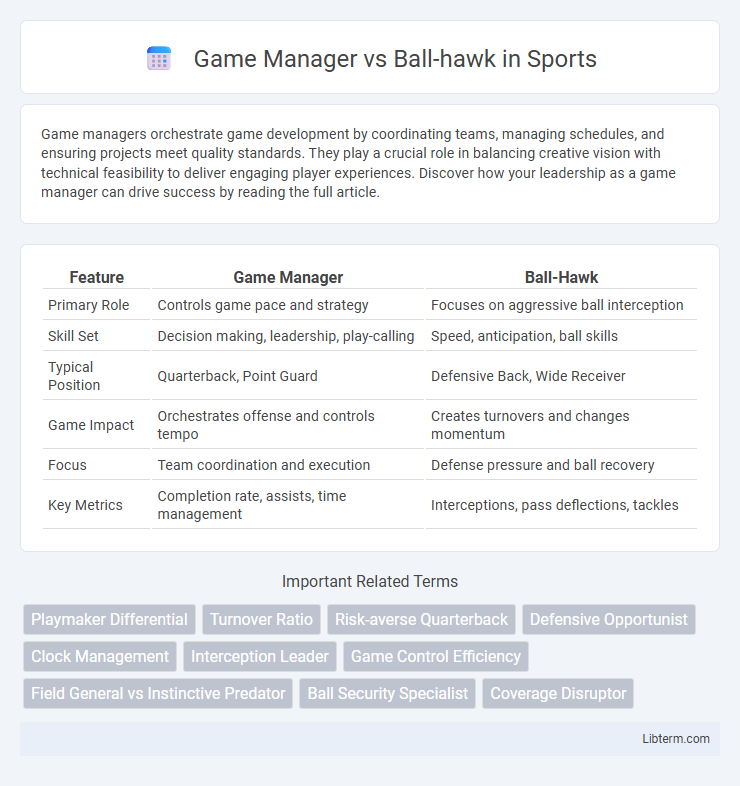Game managers orchestrate game development by coordinating teams, managing schedules, and ensuring projects meet quality standards. They play a crucial role in balancing creative vision with technical feasibility to deliver engaging player experiences. Discover how your leadership as a game manager can drive success by reading the full article.
Table of Comparison
| Feature | Game Manager | Ball-Hawk |
|---|---|---|
| Primary Role | Controls game pace and strategy | Focuses on aggressive ball interception |
| Skill Set | Decision making, leadership, play-calling | Speed, anticipation, ball skills |
| Typical Position | Quarterback, Point Guard | Defensive Back, Wide Receiver |
| Game Impact | Orchestrates offense and controls tempo | Creates turnovers and changes momentum |
| Focus | Team coordination and execution | Defense pressure and ball recovery |
| Key Metrics | Completion rate, assists, time management | Interceptions, pass deflections, tackles |
Understanding Game Manager and Ball-Hawk Roles
Game Managers prioritize strategic decision-making, controlling the pace and minimizing turnovers to lead their teams effectively, often excelling in leadership and football intelligence. Ball-Hawks specialize in aggressively reading the quarterback and anticipating plays to create turnovers, particularly interceptions, significantly impacting defensive success. Understanding these distinct roles highlights the balance between calculated game control and opportunistic playmaking in football defense.
Key Characteristics of a Game Manager
A Game Manager excels at controlling the pace of the game, minimizing risks, and making smart, low-turnover decisions to maintain team stability and field position. Their key characteristics include consistent accuracy in passing, the ability to read defenses effectively, and a strong leadership presence that guides the offense methodically. Unlike a Ball-hawk who thrives on aggressive plays and turnovers, the Game Manager prioritizes ball security and strategic execution to avoid costly mistakes.
Defining the Ball-Hawk Mentality
The ball-hawk mentality embodies relentless anticipation and aggressive pursuit of turnovers, distinguishing players who excel in interceptions and disrupting opponent plays. Unlike the game manager, who prioritizes safe, strategic decisions to minimize errors and maintain control, the ball-hawk actively exploits risky opportunities to shift momentum. This mindset requires sharp instincts, quick reactions, and a fearless approach to read offenses and capitalize on every chance to change the game's outcome.
Decision-Making: Control vs. Aggression
Game Managers excel in decision-making by prioritizing control and strategic play, minimizing risks to maintain possession and manage the game's tempo effectively. Ball-hawks demonstrate aggressive decision-making, constantly seeking turnovers and capitalizing on opponents' mistakes to shift momentum and create scoring opportunities. The contrast in their approaches highlights control-driven stability versus high-impact opportunism in defensive roles.
Impact on Team Strategy
A Game Manager focuses on minimizing errors and managing clock control, contributing to a disciplined and methodical team strategy that emphasizes consistency and situational awareness. In contrast, a Ball-hawk aggressively pursues turnovers and big plays, creating opportunities for momentum shifts and explosive scoring, which can force opponents to adjust their offensive tactics. Teams relying on a Game Manager often prioritize ball control and field position, while those with a Ball-hawk prioritize defensive pressure and opportunistic playmaking to disrupt the opponent's rhythm.
Strengths and Weaknesses Compared
Game Managers excel in controlling the pace and making smart decisions, which reduces turnovers and sustains drives; however, their conservative style may limit explosive plays. Ball-hawks thrive on their aggressive instincts and exceptional ball skills, creating turnovers and shifting momentum, but they risk higher penalties and inconsistencies due to their high-risk approach. The strength of a Game Manager lies in reliability and minimizing mistakes, while a Ball-hawk's strength is in playmaking and defensive disruption, with weaknesses stemming from predictability and potential over-aggression, respectively.
Notable Game Managers in History
Notable game managers such as Tony La Russa and Joe Torre have demonstrated exceptional strategic acumen by effectively handling pitching staffs and making crucial in-game decisions that lead to championships. These managers excel in roster management, situational hitting, and defensive alignments that maximize team performance. In contrast to "ball-hawks," who are known for defensive prowess and ball control, game managers influence outcomes through tactical leadership and game planning.
Legendary Ball-Hawks and Their Legacy
Legendary ball-hawks like Ed Reed, Troy Polamalu, and Earl Thomas redefined defensive playmaking with unparalleled interception skills and ball-tracking instincts, leaving a lasting legacy in the NFL. Their ability to anticipate offensive schemes and execute game-changing plays distinguishes them from typical game managers who focus more on strategic consistency than highlight-reel turnovers. These iconic defenders remain benchmarks for aspiring safeties, embodying the art of disruptive defense and cementing their status in football history.
Situational Effectiveness on the Field
Game Managers excel in maintaining consistent offensive drives and minimizing turnovers, proving highly effective in controlling the clock and managing field position during critical moments. Ball-hawks demonstrate superior situational awareness and ball skills, often creating turnovers through interceptions or forced fumbles that can shift momentum instantly. In high-pressure scenarios, Game Managers optimize team stability, while Ball-hawks provide game-changing defensive impact by capitalizing on opponents' errors.
Choosing the Right Style for Team Success
Selecting between a Game Manager and a Ball-Hawk quarterback style hinges on team dynamics and strategic goals. Game Managers excel in minimizing mistakes and executing conservative plays, ideal for teams with strong defenses and reliable scoring options. Ball-Hawks thrive on aggressive playmaking and creating turnovers, fitting squads that rely on high-risk, high-reward tactics to disrupt opponents and generate momentum.
Game Manager Infographic

 libterm.com
libterm.com